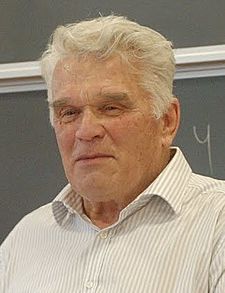Ludvig Faddeev facts for kids
Quick facts for kids
Ludvig Faddeev
|
|
|---|---|

Ludvig Faddeev during a talk at Aarhus University, August 2010
|
|
| Born | 23 March 1934 |
| Died | 26 February 2017 (aged 82) |
| Nationality | Russian |
| Alma mater | Saint Petersburg State University |
| Known for | Faddeev–Popov ghosts Faddeev equations Faddeev–Senjanovic quantization Faddeev–Jackiw quantization |
| Awards | Dannie Heineman Prize (1975) Dirac Prize (1990) Max Planck Medal (1996) Pomeranchuk Prize (2002) Demidov Prize (2002) Poincaré Prize (2006) Shaw Prize (2008) Lomonosov Gold Medal (2013) |
| Scientific career | |
| Fields | Mathematics, theoretical physics |
| Institutions | Steklov Institute of Mathematics |
| Doctoral advisor | Olga Ladyzhenskaya |
| Doctoral students | Vladimir Buslaev Nicolai Reshetikhin Samson Shatashvili Evgeny Sklyanin Leon Takhtajan Vladimir Korepin |
Ludvig Dmitrievich Faddeev (born March 23, 1934 – died February 26, 2017) was a very important Russian scientist. He was a mathematical physicist, which means he used advanced math to understand how the universe works.
He is famous for several big ideas in physics. One is the Faddeev equations, which help explain how three tiny particles interact. He also helped develop ways to understand gauge field theories. This included introducing "Faddeev–Popov ghosts" with another scientist, Victor Popov.
Faddeev led a group of scientists in Leningrad (now Saint Petersburg). Together, they created a method called the quantum inverse scattering method. This helped them study complex systems in quantum physics. His work also led to the idea of quantum groups.
About Ludvig Faddeev
Ludvig Faddeev was born in Leningrad, Russia. His parents were both mathematicians. His father, Dmitry Faddeev, was a well-known algebra expert. His mother, Vera Faddeeva, was famous for her work with numbers in computers.
Ludvig went to Leningrad University. He chose to study physics instead of math. He wanted to be independent from his father. But he still learned a lot of math from other great teachers. He finished his advanced studies in 1959. His research was about how particles scatter or bounce off each other. His teacher was Olga Ladyzhenskaya.
Leading a Research Institute
From 1976 to 2000, Faddeev was the head of a big science center. This was the St. Petersburg Department of Steklov Institute of Mathematics of Russian Academy of Sciences. He also visited CERN in Switzerland many times. CERN is a famous place where scientists study tiny particles.
In 1988, he started a new place called the Euler International Mathematical Institute. This institute is now part of the Steklov Institute.
Awards and Recognition
Ludvig Faddeev was a member of the Russian Academy of Sciences starting in 1976. This is a very high honor for a scientist in Russia. He was also a member of many other important science groups around the world. These included the U. S. National Academy of Sciences and the Royal Society in the UK.
He received many awards for his amazing work:
- USSR State Prize (1971)
- Dannie Heineman Prize (1975)
- Dirac Prize (1990)
- Max Planck Medal (1996)
- Demidov Prize (2002) – for his work in mathematics and quantum mechanics.
- Henri Poincaré Prize (2006)
- Shaw Prize in mathematical sciences (2008)
- Lomonosov Gold Medal (2013)
Faddeev also received several awards from the Russian government. These included the Order of Merit for the Fatherland and the Order of Lenin. He was also named an Honorary Citizen of St. Petersburg in 2010. From 1986 to 1990, he was the president of the International Mathematical Union. This is a global organization for mathematicians.
See also
 In Spanish: Liúdvig Faddéyev para niños
In Spanish: Liúdvig Faddéyev para niños

